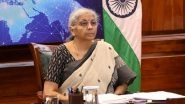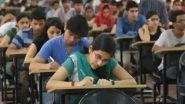Seoul, Aug 1 (AFP) A North Korean soldier crossed the Demilitarised Zone that divides the peninsula, Seoul's military said Thursday, in a rare direct defection across the heavily fortified frontier.
More than 30,000 North Koreans have escaped to the South since the two were separated by war more than 65 years ago, according to Seoul government data, many of them driven by prolonged economic hardship.
But the vast majority have gone first to the North's neighbour and ally China before making their way to the South, usually via a third country.
Only a few have dared to cross the DMZ, which is riddled with landmines and has a heavy military presence on both sides.
In November 2017, a North Korean soldier made global headlines when he dashed through the border village of Panmunjom in a hail of gunfire from his own side. The trooper, then 24, was hit several times but survived.
The defection announced Thursday, which took place in the central part of the peninsula, was only the third such crossing since then.
The man was seen late Wednesday night in the DMZ moving in a southerly direction after crossing the Military Demarcation Line that forms the border, Seoul's Joint Chiefs of Staff said in a statement.
He was taken into custody "in accordance with procedures" and was being questioned, they added.
Aside from the fact he was a soldier, there was no immediate word on the man's identity or his motives.
"No particular North Korean military movement is seen across the border," the Joint Chiefs said.
The DMZ is the Cold War's last frontier, separating the nuclear-armed North from the democratic and economically advanced South.
In 2012 a North Korean soldier walked unchecked through rows of electrified fencing and surveillance cameras, prompting Seoul to sack three field commanders for the security lapse.
But it is extremely rare for the North's troops to defect at Panmunjom, a major tourist attraction and the only place on the frontier where forces from the two sides come face-to-face.
Contact between the North and South has been minimal since February, when a second summit between the US and Pyongyang collapsed without an agreement over possible denuclearisation and sanctions relief.
Pyongyang is under heavy economic sanctions over its nuclear weapon and ballistic missile programmes, and carried out its latest launches earlier this week.
It denounces defectors -- who are an important source for accounts of the regime's treatment of its citizens -- as "human scum".
Beijing sees unauthorised North Koreans on its territory as illegal migrants and sends those it detains back to the authoritarian state, where according to international human rights groups they face torture and imprisonment.
While defections in the other direction are extremely rare, a 72-year-old South Korean man defected to Pyongyang last month, following in the footsteps of his parents who made a high-profile switch of allegiance in the 1980s.
In the past a small number of South Koreans in economic difficulties have defected to the North, but Pyongyang has repatriated many of them as they hold little propaganda value. (AFP)
(The above story is verified and authored by Press Trust of India (PTI) staff. PTI, India’s premier news agency, employs more than 400 journalists and 500 stringers to cover almost every district and small town in India.. The views appearing in the above post do not reflect the opinions of LatestLY)













 Quickly
Quickly


